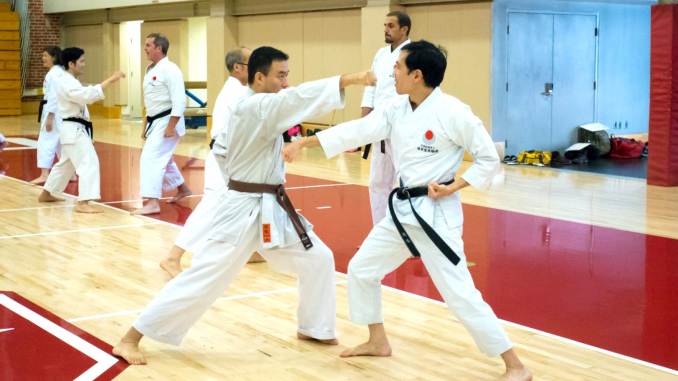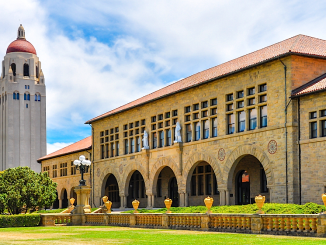
This story originally appeared in the Sept. 4 print edition of the Daily Post. To get all the local news, including many stories you can’t find online, pick up the Post every morning at 1,000 Mid-Peninsula locations.
BY SARA TABIN
Daily Post Staff Writer
Stanford is devastating campus clubs through a crackdown on non-student club members, according to a dozen students and alumni who spoke about their concerns with the Daily Post.
Stanford in June suspended student clubs deemed out of compliance with university policy, including its 13 martial arts groups, dance groups and the archery team.
In August, the university said most of the groups could return if they comply with tighter regulations. But students say the rules, including a ban on non-student participants, will ruin the communities they have worked hard to create.
Jessica Luo, co-president of Stanford Wushu, which practices a form of Chinese Kung Fu which involves aerobics and swords as well as hand-to-hand combat, said the group includes Stanford alumni and employees as well as local Wushu enthusiasts.
Since Wushu is a sport that takes years to master, the students in the club have the advantage of learning from more experienced members.
Jim Shen, a UC-San Diego alumnus who participated in Stanford Wushu over the past four years while working at Stanford’s Center for Educational Policy Analysis, also noted the benefits that students receive when skilled Wushu artists practice with them. He said USA Wushu Team member Brian Wang has attended Stanford Wushu practices on an irregular basis over the past few years.
“If Seth Curry wanted to come practice with the intramural basketball team, I don’t think the school would say no that’s not beneficial,” he said.
Shen said UCSD’s Wushu team similarly benefited from the presence of non-student members and outside coaches.
Mental health benefits
Luo, who joined Wushu the spring semester of her freshman year, said there are mental health benefits to interacting with people not caught up in the rush of Stanford.
“The pressure to compete with other people and master something quickly and be excellent at it, a lot of people get into Stanford because of their ability to do that but suffer from living their lives under that pressure,” explained Luo. “Having a practice that exists on a different time scale helps.”
She said the community members have contributed to the club in material ways, including renting cars to drive students down to last year’s Collegiate Wushu Tournament at UC-Irvine.
Non-student members also pay dues that are higher than students pay. Shen said if Stanford is concerned that money is being diverted from students, they should increase dues for non-students instead of banning them.
Luo expressed concern over whether the Stanford Wushu team will be allowed to compete nationally or even retain the outside coaches they have hired since they do not have designation as an official athletic club. Last year they took second at nationals.
Stanford’s response
Brad Hayward, associate vice president for university communications, responded to questions from the Post with links to the university’s press release on martial arts clubs. The release says that the mix of students and non-students engaging in activities introduced “complexities” for which the university had not planned. Hayward also said Stanford is providing all impacted clubs, including non-martial arts groups, with a list of adjustments and materials to prepare for review so they can return in the fall.
Matthew Choi, a Stanford alumnus and Wushu artist who helped spearhead a letter writing campaign to bring back the banned clubs, said he thinks the university is likely worried about liability for non-students.
Clubs meet in Stanford facilities, typically at no cost.
Stanford has created a student organization working group to examine appropriate levels of non-student involvement in clubs and to determine what sort of oversight is needed for student clubs. The committee is supposed to submit a final report to Vice Provost Susie Brubaker-Cole by December.
Brett Salazar, president of the Stanford Martial Arts Program and a Brazilian Jiu Jitsu martial artist, said he has been working closely with the administration and has a lot of faith in the working group. He said he believes the university understands the complexities of the clubs’ needs. But Salazar said it was unfair of the university to suddenly spring the suspension on students.
Stanford didn’t reach out to student leaders before announcing the summer suspension and have yet to answer all of his questions about rules for the fall semester, he said.
Salazar is not the only one who expressed confusion about the process Stanford is taking.
Aerobics and yoga, too
Nicole Xu, president of Stanford Aerobics and Yoga or SAY, said that she met with administration in February shortly after she became president. At the time she was told that at least 50% of class attendees had to be students and club officers could not be paid but student teachers could. In June the administration informed her that class attendees all had to be students and no one could be paid.
SAY has garnered more than 800 signatures on a petition asking the administration to reverse those positions. Many signees have commented that SAY’s classes are more affordable than outside studios and important to their mental health.
Francis Parchaso, Stanford’s head archery coach, said the group will not be able to hold its weekend junior archery practice during the fall semester.
Weekend lessons given by the team members to local kids have been a source of revenue for the club for nearly 20 years and in the past have generated so much money that archery donated some to other clubs. The fundraising activity also gave Stanford students a chance to learn about running a business, he said.
“It seemed to be a win-win for everybody except we have been told it’s against the rules,” he said.



The Ombuds will not report your visit or the reasons for it unless you specify it. This rule will only be broken if the Ombuds representative notices that you or someone else is in danger. The only exception to the privilege of confidentiality is when there seems to be an imminent risk of serious harm. Communications with the Ombuds office cannot be used in formal grievance or grievance procedures. by Yoga Classes in Coimbatore